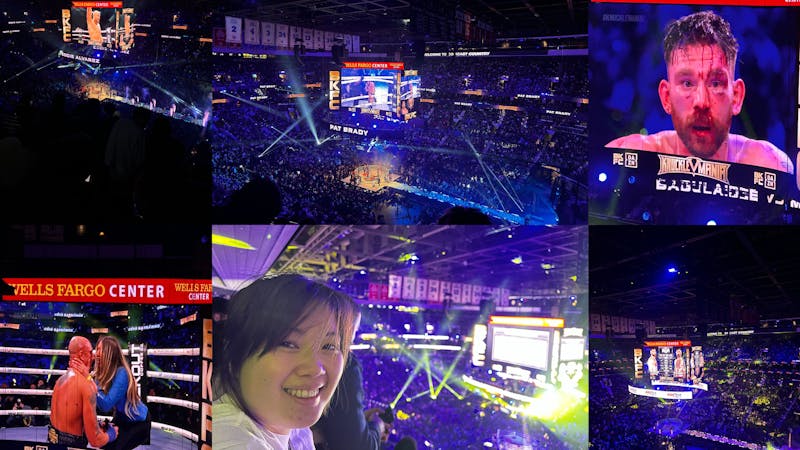Soft wind accompanies the sound of golf clubs brushing the perfectly cut grass. The sun’s rays illuminate highlights and shadows on the caps of the attendees. It’s the perfect golf weather. Surely, every player should be performing to the best of their abilities, right?
For more casual fans who watch the occasional golf tournament, it's easy to assume that a pro golfer’s performance may just be based on skill level. However, there is so much more that could be happening behind the scenes that impact the success of a golfer, and it's hard for individuals to see that side of their favorite professional athletes. Full Swing offers a rare insight into that little–explored world.
Full Swing is a reality TV show that follows golfers (like Keegan Bradley, Sahith Theegala, and Bryson Dechambeau) throughout their time on tour, competition in major tournaments, and personal experiences. It dives deeper beneath what is usually streamed from a typical golf tournament. Season three of the series recently released on Netflix and follows matches like the Presidents Cup, the FedEx Cup, and the US Open. While the US Open is the only major tournament out of the three, the Presidents Cup is a match between the United States and international teams, and the FedEx Cup is a year–long tournament where the athletes during playoffs are decided by wins and rankings during matches throughout the PGA Tour.
The third episode, titled “Don’t Call It a Comeback,” follows Rory McIlroy, ranked number two in the Official World Golf Ranking, after the sudden announcement that he has filed for divorce. As a result of the stress, he does not perform well during the PGA Championship, which strayed from his pattern of recent success during past tournaments. Professional athletes often struggle to separate their game from their personal and family lives, and when these two aspects intersect, it has implications beyond just their athletic performance. Because this situation was highly covered by the press, public attention was not put on McIlroy’s game, but rather his family—which created tensions and caused his focus to shift elsewhere.
On the other hand, the show displays how players can overcome challenges and preserve through pressure. Episode three follows Scottie Scheffler, who is ranked number one in the Official World Golf Ranking, when he gets arrested after a miscommunication with a police officer during the PGA Championship. Despite spending the morning before his tee–time in jail, he is able to carry on and maintain a steady performance throughout his round. Scheffler’s success implies that a player’s ability to solely focus on their game and strategize is just as important as their skill set on the golf course. Of course, the circumstances between the two players in this episode are unique from one another. A different kind of stress is presented to athletes (and individuals in general) when their personal and family life is publicized for the whole world to comment on during their round.
Beyond the challenges within the mental game of the sport, there are also external pressures to the game that make it particularly difficult. The stakes are high for every match, but this particular season amplified the stakes even more because players had to compete for spots in the Olympics. In the episode “Two Tickets to Paris,” Min Woo Lee and Wyndham Clark push themselves to their limits in order to qualify for their countries' Olympic teams. While they are both able to make it to compete in Paris, Full Swing explores the ways in which that high level of pressure can sometimes contribute to difficulties during games, and in some cases, can cause someone to crack.
This season of Full Swing also included a unique feature that it had not included in seasons prior: old and archival footage of golfers leading up to their current position within the show. This editing style alongside the interviews and footage of tournaments made this season particularly entertaining and informative. Not only that, but it can also be incredibly easy for fans of sports to make celebrities out of their favorite athletes. They can forget that these individuals also have their own personal lives, with similar stresses and struggles. At the end of the day, everyone is dealing with troubles and pressures, and like all of us, for players, sometimes it's hard to separate that from time on the golf course. Ultimately, Full Swing invites audiences behind the scenes of golf’s most anticipated and prestigious tournaments in order to understand that the game of golf is not as simple as it seems. It's far more complex than a player navigating yards of grass with a club in order to get a ball from a tee box to a hole in the fewest amount of shots possible.
While shouts of disappointment on the 18th hole are a sound that no attendee, viewer, or professional athlete wants to hear, it also serves as a reminder that golf is not just a game of skill. It is a test of mindset and ultimately, the most difficult parts of the sport are dealing with hardships, working meticulously, and adjusting to difficulties within seconds. Their work does not just start and end on the golf cart. It begins the moment that they wake up to practice, compete, and complete press interviews. Full Swing reminds fans of the humanity of their favorite golfers by demonstrating the pressure, hardships, and fears that they must face and overcome on a daily basis.






